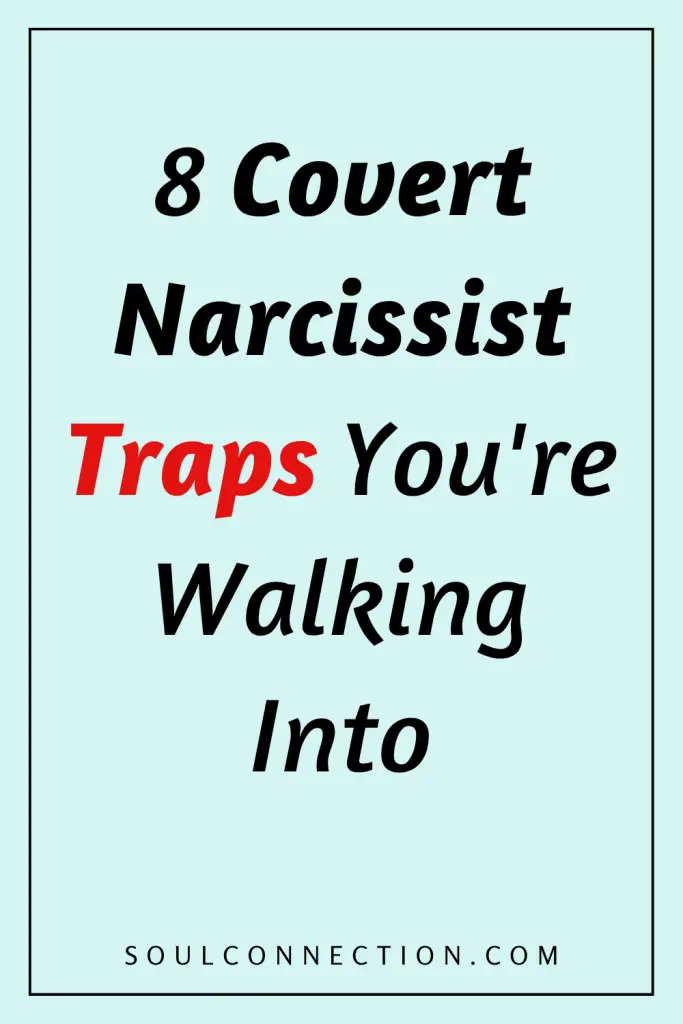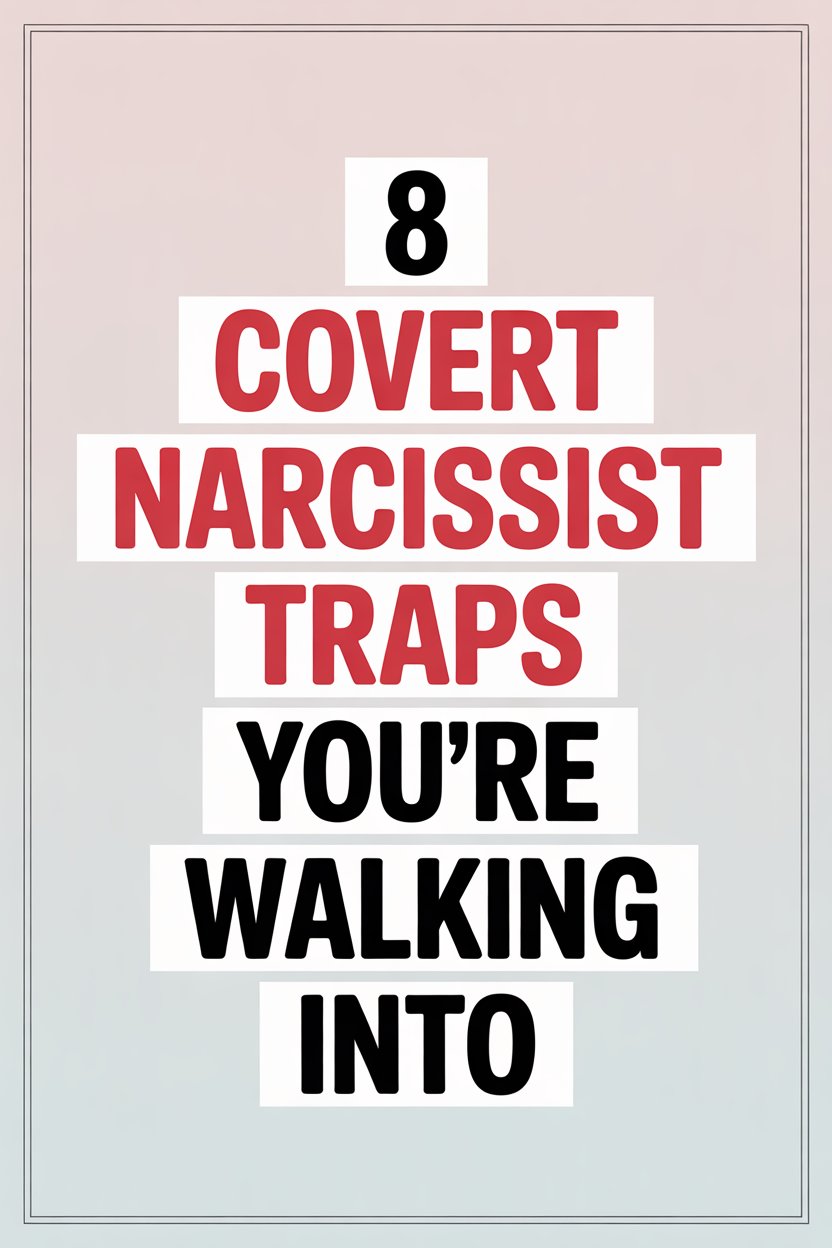Just when you thought narcissists couldn’t get any sneakier, along comes the “covert” variety—subtle, sweet-faced, and ten times as confusing.
If you’re tired of feeling like you’re starring in a psychological thriller (without the paycheque or popcorn), you may want to see if any of these covert narcissist traps sound a bit too familiar.
Buckle up. It’s going to be a bumpy, enlightening ride.
1 Emotional Booby Traps Disguised as Vulnerability
Covert narcissists are experts at playing the “wounded bird” card. One minute, they’re opening up about their painful childhood or that time their goldfish died (tragic, yes), and the next, you’re the emotional first responder.
Suddenly, your role in the relationship is less “partner” and more “empathy vending machine.”
It feels nice to be needed—at first. But watch closely. That sharing, that openness, always pivots back to their pain, their struggles, their need for support. Your feelings? A footnote.
If you find yourself constantly comforting and reassuring someone who never seems to have the emotional bandwidth to do the same for you, congratulations: you’ve stumbled into the Covert Narcissist Pity Trap.
Want out? Start noticing whose needs always take priority. Set boundaries, even if it means someone’s emotional weather forecast turns a bit stormy.
2 The Compliment-Bait Switch
Ever had a friend or partner who heaps praise on you—then immediately deflates you with a sly jab? “You’re so clever at that… unlike most people I know. Must be nice not to struggle with basic chores.” Sound familiar?
Covert narcissists use compliments as a lure. You’ll feel special, unique, chosen. Then, once your ego is nice and inflated, you’re hit with something that leaves you just off-kilter enough to crave more of their approval.
This cycle of sweet talk and subtle digs makes you work overtime to keep their validation coming, all while eroding your self-confidence. It’s like being given a birthday cake but told you can only eat one crumb at a time.
Awareness is your shield here. Compliments should not come with backhanded terms and conditions.
3 The Guilt-Trip Express
If you’ve ever found yourself apologising for things that aren’t your fault—like your own feelings, or for not being psychic—you might just be riding the Guilt-Trip Express, courtesy of a covert narcissist.
They have a knack for flipping the script, making their neglect or bad behaviour somehow your responsibility. Cancelled plans? Suddenly you’re inconsiderate for expecting them to show up. You express a need? Now you’re “too much.”
Spoiler: you’re not. Their guilt tactics keep you walking on eggshells, forever anxious to keep them happy.
Standing your ground, even when it feels uncomfortable, is the antidote. Your feelings are valid, and you’re not responsible for managing someone else’s emotional laundry pile.
4 The Martyr Olympics
Gold medals await in the Martyr Olympics, and covert narcissists are always on the podium. They’ll go out of their way to remind you just how much they sacrifice.
“I did all this for you, and this is the thanks I get?” or “Nobody appreciates me around here.”
Every act of kindness has a hidden scoreboard, and you’re always in debt. Funny how you never quite catch up.
This emotional accounting keeps you scrambling to even the score. Before you know it, you’re overcompensating, showering them with appreciation, just to avoid another lecture on their endless suffering.
You’re not obliged to keep tally. Real relationships aren’t competitive sport.
5 The Mysterious Disappearing Act
Ever been ghosted for a day or two after a minor disagreement, only for the person to pop back up as if nothing happened? (Like a magician pulling themselves out of a hat, minus the applause.)
Covert narcissists use silent treatment and disappearing acts to punish, confuse, and control. The message is clear: disappoint them, and you’ll be sentenced to a cold war of isolation.
This tactic trains you to avoid conflict at all costs—lest you trigger another round of radio silence.
Recognising this as emotional manipulation is crucial. Healthy adults talk things out. Vanishing into thin air is for sitcom characters and, apparently, covert narcissists.
6 The “Supportive” Saboteur
On the surface, your covert narcissist is your biggest fan. They root for your dreams, encourage your ambitions—right up until you start succeeding.
Suddenly, their “support” comes with faint praise or concern that you’re getting “too busy,” “too distracted,” or “too full of yourself.”
Subtle undermining follows: “Are you sure you can handle that?” or “I just worry you’ll fail and be disappointed.”
Their ego can’t handle your glow. So they dim your light, ever so gently.
Real support feels like wind in your sails, not a leak in your boat. Keep an eye out for those “helpful” comments that seem to shrink your confidence instead of inflating it.
7 The Never-Ending Mystery Game
Honesty and transparency? Those are for mere mortals. Covert narcissists thrive on keeping you guessing.
They’ll be vague about their feelings, keep plans ambiguous, and offer just enough information to pique your curiosity but never enough to satisfy it.
You’re left chasing clarity, analysing every text and sideways glance, stuck in a perpetual state of relationship Sudoku.
This confusion is intentional—it keeps you off-balance and prevents you from getting too comfortable (or seeing the exit door).
Trust your gut. If you feel perpetually puzzled, it’s not because you’re clueless—it’s because someone is feeding you a never-ending riddle.
8 The Victim Reversal Routine
When all else fails, the covert narcissist pulls out their trump card: becoming the ultimate victim. They deflect criticism or accountability by turning your concerns into a personal attack.
Suddenly, you’re the villain for bringing up an issue, and they’re the ones suffering.
Criticise something they’ve done? Now the conversation is about how hurtful you’re being. Ask for change? Clearly, you’re impossible to please.
Don’t fall for the role-reversal magic trick. Hold steady to your boundaries and refuse to let the conversation spiral back to their wounded ego every single time.
Unpacking the Invisible Strings
Getting wise to these covert games isn’t about blaming yourself for falling into them. Traps are designed to be, well, traps—subtle, sticky, and hard to spot until you’re knee-deep in self-doubt and second-guessing your own reality.
If you see yourself in any of these scenarios, be gentle. You’re not dense. You’re not weak. You’re human, and you want to believe the best in people—especially those you care about. That’s admirable, not a flaw.
Now’s the time to turn some of that empathy inward. Notice the patterns. Question the scripts. Set boundaries, even if your inner people-pleaser throws a fit.
You deserve relationships where you’re not the only one doing emotional heavy lifting.
Covert narcissists thrive on confusion and second chances. They bank on your self-doubt. Wipe the fog off the mirror and trust what you see.
If these traps sound like your love life, it’s not just you. It’s not your fault.
And no, you’re not starring in a psychological thriller.
But if you were, you’d definitely be the one who makes it out alive, learns a thing or two, and starts demanding Oscar-worthy relationships only.


